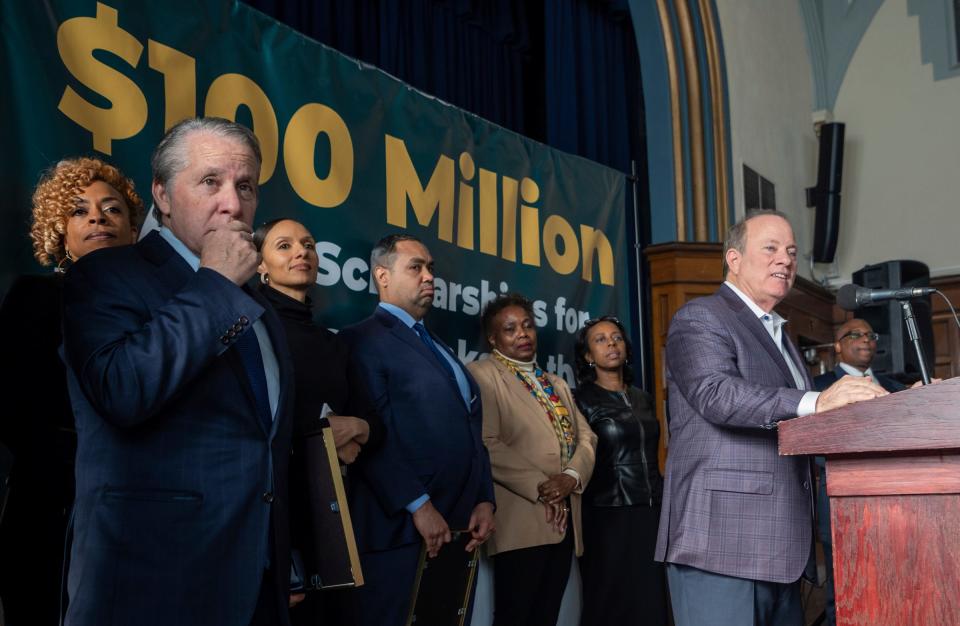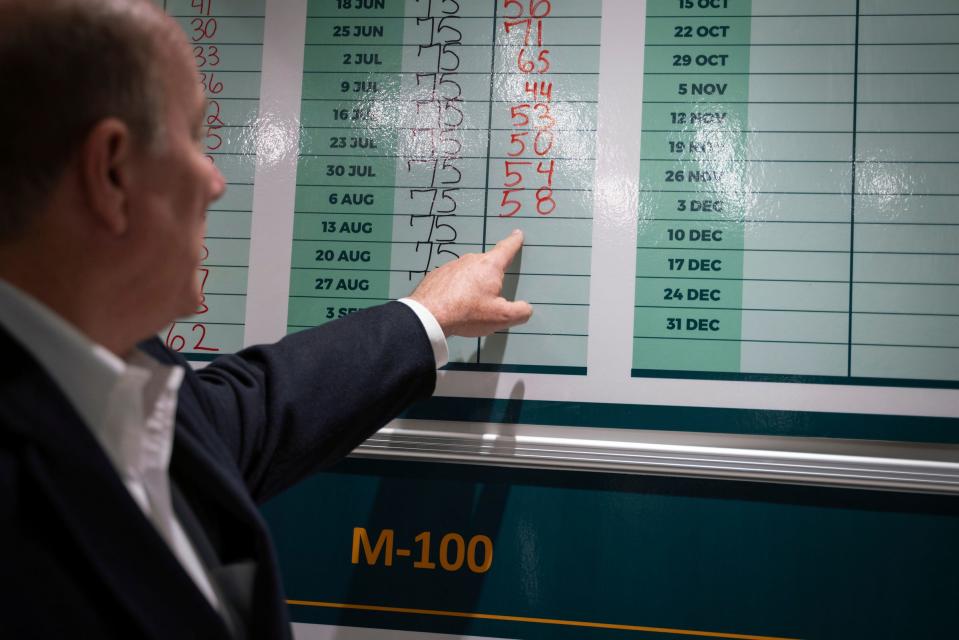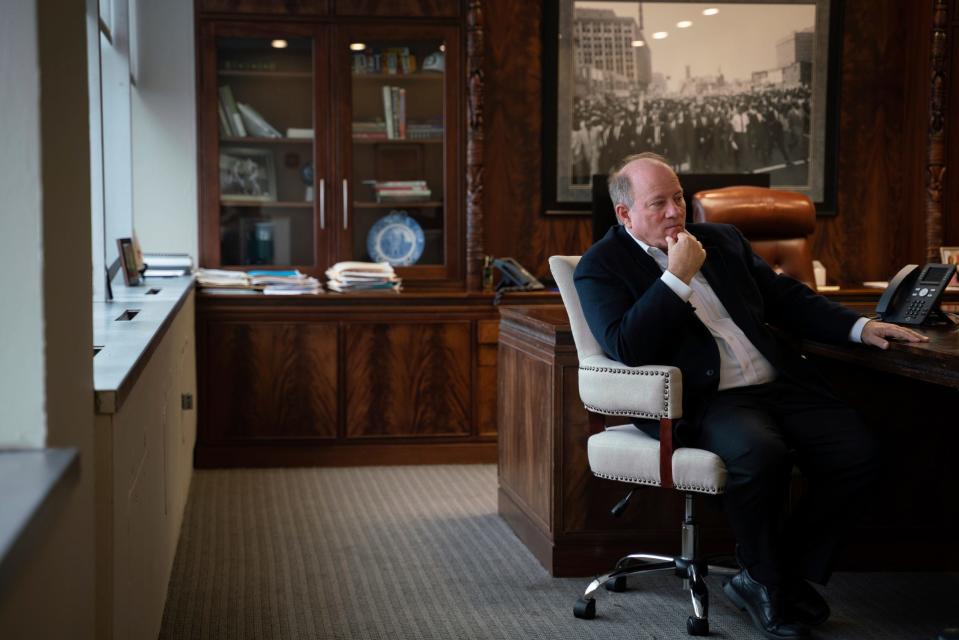Mayor Mike Duggan flexes White House ties to drive money, aid to Detroit
- Oops!Something went wrong.Please try again later.
- Oops!Something went wrong.Please try again later.
- Oops!Something went wrong.Please try again later.
One night during his honeymoon in Egypt in 2021, Mayor Mike Duggan received a call from the White House about securing federal money for Detroit’s blight problem.
Gene Sperling, President Joe Biden’s senior adviser and American Rescue Plan Act coordinator, urgently sought Duggan’s advice on the final spending rules involving demolitions. As Sperling prepared to submit the regulations, he went through key language line by line with Duggan to safeguard Detroit's blight removal program — at the president's request.
Why? Because Duggan and Biden need each other ― and they get along.
“My wife wasn’t very happy, but I answered the phone, and he says, ‘I need to talk to you about something,' " Duggan said. “Gene Sperling knew enough about Detroit but trusted me enough to be able to have a conversation to say, ‘We're trying to help Detroit's recovery, how do we do this?’ " Duggan said.

And it paid off. Duggan’s lobbying and deep ties to Washington, D.C., landed more than $826 million in pandemic aid, situating Detroit as the fifth-largest recipient of ARPA funds in the nation, creating the opportunity to invest in a range of city projects.
So far, though, Detroit is lagging behind many cities in committing the money. If money remains unused after a hard deadline, cities must relinquish funds back to the federal government.
The city must obligate funds by December 2024 and spend them by December 2026. As of Oct. 30, Detroit had spent 19% of its money, lagging behind comparable cities including Memphis and Cleveland.
Duggan vowed, in an interview with the Free Press, to have $600 million obligated by the end of the year and all $826,675,290 by June 2024. "Obligated money" means it will have been approved for spending by the City Council through contracts. Duggan is against pouring large amounts of the one-time funding into the city’s general fund, as some cities have done, due to a boost in revenue from online gaming.
How Duggan developed rapport with Biden
Sperling, who served as former President Barack Obama's economic policy adviser, told the Free Press "the president really likes" Duggan. In one of Sperling's first Oval Office conversations with Biden, Sperling said the president specifically handpicked Duggan as someone to directly contact for overall advice on coordinating the ARPA implementation.
"The president took Detroit’s rescue seriously and he developed a close working relationship and high respect for Mayor Duggan, and they are very loyal to each other," Sperling said. Duggan is "also well-liked by other mayors, who’ve taken after his ARPA programming plan, and is someone you check in with generally to get advice on general ARP implementation issues."
The third-term mayor has flexed his ties to the White House, which began when he first met then-Vice President Biden in January 2014 — Duggan’s first month as mayor — for a meal at Amore da Roma, formerly Roma Café, where he used the meeting to request aid for city services. He later led Biden and his security team on a tour of abandoned houses to auction and “hit it off," Duggan said. Since then, they have endorsed each other, met for a solo lunch at the White House and Christmas celebrations at the U.S. Naval Observatory.
“He totally bought into where we were going and what we were doing, and it became a deeply personal connection," Duggan said.
Years later, playing a pivotal role in influencing the $1.9 trillion American Rescue Plan Act, Duggan, among the U.S. Conference of Mayors, advocated for a disbursement model using the Community Development Block Grant to benefit need-based cities facing poverty and distress. Duggan said an initial idea was to base awards entirely on U.S. Census population assessments, whose results Duggan is fighting.
Funding in Detroit addresses issues from blight, the digital divide, housing, jobs and education, recreational center renovations and more in Detroit.
Prior to ARPA, the federal government passed the Coronavirus Aid, Relief, and Economic Security Act to help states avert economic challenges. The formula was based on population and funneled significantly less to Detroit. Its $117 million from that law was the 27th largest amount of any city in the country, according to the Office of the Chief Financial Officer.
Deputy CFO and Budget Director Steve Watson said “clearly, steering the formula to (the block grant model) benefited Detroit tremendously.”
“There was nothing about the formula that carves Detroit out," Duggan said. "But when you use poverty and the criteria they used, you drove more of the money. … It isn't like they gave us money because we're friends. But the trust level is so high.”
Detroit's place in presidential politics
Presidents ally with big city politicians for their own operations, whether to secure votes for an election, especially in a swing state, or to polish their policy portfolios by pointing to a city's successes. Biden, in the 2020 presidential election, won 94% of the vote in Detroit, and he needs big turnout here in 2024. According to recent polls, Biden is falling behind former President Donald Trump in several battleground states, including Michigan.
The tie traces back to Obama, who won Detroit in both of his elections.
Obama was adamant about recovering Detroit's political and economic turmoil, according to Rip Rapson, president and chief executive officer of Kresge Foundation, which funds numerous projects in Detroit. Through conversations with Derek Douglas, his urban policy adviser, Obama vowed that he was "not going to let Detroit become the Katrina on my watch," Rapson said.
"The president said many times that it was incumbent on the administration to ensure the survival, recovery and health of one of the nation’s most iconic cities and one that gave birth to the nation’s Black middle class," Rapson said.
Previous Detroit mayors had deep links to the White House.
Jerome Cavanaugh spearheaded the Total Action Against Poverty program, which provided job training, counseling, health exams, legal aid, education and more through nearly $360 million in federal funds. Coleman Young was an early supporter of Jimmy Carter's presidential bid, and their relationship led to a job offer as U.S. Secretary of Housing and Urban Development, though Young turned it down. Young also secured federal programs to buy and develop riverfront property.
John Truscott, CEO of Detroit-based bipartisan PR firm Truscott Rossman, has seen such relationships in real time as former Gov. John Engler’s communications director and press secretary. Through the Republican National Committee, Truscott also served as a spokesman for ex-President George W. Bush's campaign and aided his transition to office. As a close ally to Bush, Engler was invited to many “personal things” with the president in Washington and Texas.
Engler was called into a Republican governor’s meeting ahead of the Bush campaign. The message was, “If we’re going to take back the White House, the next president has to come from this room,” Truscott said, adding it was set up to leverage Bush.
Truscott is “100% confident” that Biden is leaning on Duggan to do the same by rallying supporters in Detroit, and even describes Duggan as someone who reminds him of his old boss — someone who thinks years ahead and uses every tool in the box to get there.
“It's what you do when you're running and Mike Duggan has one of the best political organizations out there. … This is a guy who ran as a write-in” and won in 2013, Truscott said. “That is absolutely unheard of.”

Despite his ample relationships and ability to galvanize donors and voters, Duggan, 65, said he is not exploring federal office. He did not rule out a gubernatorial run in Michigan.
"Nothing in D.C. remotely appeals to me. I just want friends in D.C.," said Duggan, who will decide next year whether to seek reelection after his term ends in 2025. "That's the first decision, and then after that, I'll decide what else I'm doing. But the decision on mayor has to come first."
Detroit’s ARPA spending pace
Despite Duggan’s push for the formula which landed nearly $1 billion for Detroit and the city's seemingly slow expenditure rate, he said the city’s disbursement is "exactly where we want to be."
Cities with similar population and poverty rates to Detroit have committed more of their ARPA funds. Memphis, which has slightly more residents than Detroit's 620,376 and a poverty rate of 21.4% — Detroit’s poverty rate is 33.8% — and Milwaukee have received significantly less but spent more. Memphis spent 73% of its money, using 24% on revenue replacement, which can be poured into the city's general fund for government operations. Milwaukee, with nearly 60,000 fewer residents and a poverty rate of 22.5%, spent about 34% of its funds.

Cleveland has the closest poverty rate to Detroit but half the population. The city received $511,721,590, being the eighth-largest recipient in the nation, and spent the majority of its funds. Cleveland has 34% of funds remaining as of August, according to the Ohio Poverty Law Center.
It is unclear whether Detroit’s spending pace appears slower, in comparison, as a result of other municipalities dumping money in their city’s general fund, according to Glencora Haskins, senior research analyst for Brookings Institution. Haskins tracks patterns for revenue replacements, which have more relaxed reporting requirements than other categories, and said it’s a faster way to allocate and spend funds.
“At the same time, Detroit’s spending speed is still somewhat slower than other large cities and counties that haven’t appropriated anything towards revenue replacement. A lot of this might be tied to the blight and remediation project being led by the mayor’s office, which itself accounts for over 10% of the city’s treasury allocation but has been relatively slow to obligate and spend,” Haskins said in an email. “This isn’t necessarily surprising for projects that require a lot of procurement, but may be contributing to the slow expenditure rate overall.”
Tracking expenses has also been an issue, said Eric Scorsone, director of the Michigan State University extension center for local government and finance policy.
“Part of the problem is the U.S. Treasury is, as I expected, reducing data requirements so it’s getting harder to track stuff, but we found about half the money has been spent as of this summer (in Michigan)," Scorsone said.
Duggan's former Cabinet member Arthur Jemison, who joined in 2014 and led the city's housing, planning and development department before leaving in 2021, said Duggan is a no-excuses, high-expectations mayor who would grind through details with his advisers and set metrics for each of them to tackle. One of Jemison's was improving Detroit's compliance with federal regulators to monitor the impact of federal funding in neighborhoods and ensuring money was appropriately spent amid a federal probe. The city's demolition program was temporarily suspended in 2016 by the U.S. Treasury Department for improper documentation and bidding under Duggan's watch.
Can Detroit properly handle so much money?
"We've begun to make the case that we were able to spend money more rapidly and with better compliance," Jemison said. "The mayor was very focused ... there can be a lot of attention paid to his relationships. But in the end, when you’re interacting with your field offices and headquarters, and agencies that control these resources, you have to be able to show that if you receive the allocation, you’ll spend it."
Detroit's troubling history amid bankruptcy and a series of public corruption cases put the city under a national spotlight, including the eyes of federal law enforcement.
"That was at the forefront of my mind. The city was recovering from bankruptcy, there were questions about our ability to manage and making sure we were doing our very best for better compliance, better movement of money but also trying new things” Jemison said. “The caution is real ... the mayor went through a lot of this in the early times. Running these programs, moving a lot of money, you’ve got to be really attentive."
Duggan aims to spend every dollar on upgrades that contribute to lasting changes.

"My goal is to make everybody think, 'What would you not have gotten done if it weren't for this?' I want to accelerate Detroit's recovery by 10 years,” Duggan said, which includes ridding Detroit's commercial blight by the end of 2025, one of the mayor’s campaign promises that "better be" addressed by then.
"Nobody will come into the city and take pictures of the blight in Detroit and make up a national story. It'll be gone," Duggan said.
Dana Afana is the Detroit city hall reporter for the Free Press. Contact Dana: dafana@freepress.com or 313-635-3491. Follow her on Twitter: @DanaAfana.
This article originally appeared on Detroit Free Press: Mike Duggan ties to Joe Biden lands city nearly $1 billion

